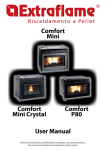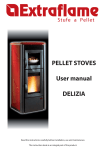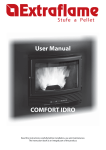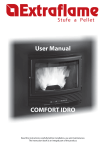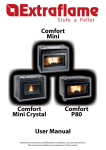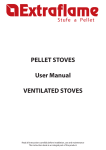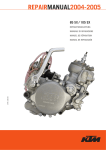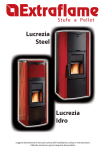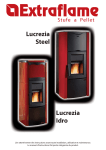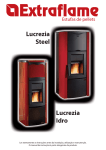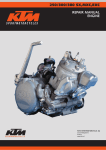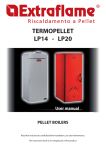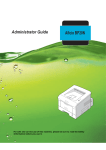Download Extraflame Pellet Stoves Instruction manual
Transcript
Stufe a Pellet Lucrezia Steel Lucrezia Idro Carefully read the instructions before installing, using and maintaining. The instructions book is an integral part of the product. 2 Congratulations! You are now the owner of an Extraflame stove! The Extraflame pellet stove is an ideal heating solution. It utilises the most advanced technology and is manufactured to the highest standards with a contemporary design, allowing you to enjoy the ambience and warmth of a natural flame in complete safety. This manual tells you how to use your stove correctly. Please read the entire manual carefully before using your stove. IMPORTANT Make sure that the dealer completes the following box with the details of the authorised specialist who will help you if you have any problems in using your new pellet stove. AUTHORISED SPECIALIST COMPANY __________________________________________________________________ Full name __________________________________________________________________ Address ______________________________________________ No. __________________ Postal Code ____________ City __________________ County. ______________________ TEL. ________________________________ FAX __________________________________ All Extraflame products are manufactured according to the following directives: 89/106 CEE (Construction Products) 89/366 CEE (EMC Directive) 2004/108 CE (EMC Directive) 2006/95 CE (Low Voltage Directive) And the following standards: EN 14785 EN 60335-1 EN 60335-2-102 EN 61000-3-2 EN 61000-3-3 EN 50366 EN 55014-1 EN 55014-2 3 4 Index Chapter 1 WARNINGS AND SAFETY DEVICES.......................................................................................................... 7 Chapter 2 WHAT IS THE PELLET? ............................................................................................................................... 8 PELLET STORAGE .....................................................................................................................................................................8 PELLET FEEDING ......................................................................................................................................................................8 Chapter 3 SAFETY DEVICES ....................................................................................................................................... 9 FLUE EXHAUST BREAKAGE ..................................................................................................................................................9 PELLET FEED MOTOR BREAKAGE ......................................................................................................................................9 NO IGNITION..............................................................................................................................................................................9 TEMPORARY POWER CUT ....................................................................................................................................................9 ELECTRIC SAFETY ....................................................................................................................................................................9 FLUE EXHAUST SAFETY DEVICE .......................................................................................................................................9 PELLET TEMPERATURE SAFETY DEVICE ........................................................................................................................9 PLANT PRESSURE SAFETY DEVICE ...................................................................................................................................9 WATER BOILING SAFETY DEVICE .......................................................................................................................................9 DEVICES NOT ON THE LIST ..................................................................................................................................................9 INSTALLATION AND SAFETY DEVICES ......................................................................................................................... 10 SAFETY DEVICES FOR OPEN VESSEL PLANT .............................................................................................................. 10 SAFETY DEVICES FOR CLOSED VESSEL PLANT ......................................................................................................... 11 Chapter 4 ASSEMBLY AND INSTALLATION INSTRUCTIONS................................................................................. 12 GLOSSARY ............................................................................................................................................................................... 12 INSTALLATION........................................................................................................................................................................ 13 ADMISSIBLE INSTALLATIONS .................................................................................................................................... 13 PROHIBITED INSTALLATIONS .................................................................................................................................... 13 CONNECTION TO THE EXHAUST VENTING SYSTEM ............................................................................................... 14 EXHAUST CHANNEL OR PIPE .................................................................................................................................... 14 CHIMNEY OR SINGLE FLUE ........................................................................................................................................ 15 CONNECTION TO THE FLUE AND COMBUSTION PRODUCT EXHAUST VENTING ................................ 17 CHIMNEY CAP ................................................................................................................................................................. 17 CONNECTION TO EXTERNAL AIR INTAKES ................................................................................................................. 18 INSULATION, TRIMS, FACINGS, AND SAFETY PRECAUTIONS.............................................................................. 18 NATIONAL, REGIONAL, PROVINCIAL AND MUNICIPAL LAWS ............................................................................ 18 Chapter 5 PRODUCT FUNCTIONALITY ................................................................................................................... 19 CONTROL BOARD ................................................................................................................................................................. 19 LANGUAGE SELECTION ...................................................................................................................................................... 19 CURRENT DATE AND TIME ADJUSTMENT................................................................................................................... 19 MODE ........................................................................................................................................................................................ 20 MODE SELECTION ......................................................................................................................................................... 21 WINTER MODE ................................................................................................................................................................ 22 SUMMER MODE .............................................................................................................................................................. 22 WINTER DOMESTIC MODE ......................................................................................................................................... 23 5 EXTERNAL THERMOSTAT FUNCTIONING IN STBY/TOFF MODE (TO ALSO BE USED FOR TELEPHONIC ACTUATOR) ............................................................................................................................................................................. 24 USE.............................................................................................................................................................................................. 24 IGNITION .................................................................................................................................................................................. 25 NORMAL FUNCTIONING .................................................................................................................................................... 26 SWITCH-OFF ........................................................................................................................................................................... 26 Chapter 6 REMOTE CONTROL .................................................................................................................................. 27 Chapter 7 WATER TEMPERATURE ADJUSTMENT .................................................................................................. 28 Chapter 8 USER PARAMETERS ................................................................................................................................ 29 WEEKLY PROGRAMMER ..................................................................................................................................................... 29 PELLET FEED ADJUSTMENT ............................................................................................................................................. 32 SPRINGS AUTOMATIC CLEANING TIMES ..................................................................................................................... 33 Chapter 9 CLEANING ................................................................................................................................................ 34 BRAZIER CLEANING ............................................................................................................................................................. 34 SPRING CLEANING ............................................................................................................................................................... 34 ASH DRAWER .......................................................................................................................................................................... 34 SMOKE CENTRAL DEFLECTOR ......................................................................................................................................... 34 DOOR AND ASH DRAWERS GASKETS ........................................................................................................................... 35 CONNECTION TO THE FLUE .............................................................................................................................................. 35 Chapter 10 COMMISSIONING OPERATIONS ............................................................................................................ 36 MOUNTING THE TILES (ONLY LUCREZIA IDRO) ........................................................................................................ 36 BRAZIER BRACKET ................................................................................................................................................................ 38 BRAZIER POSITIONING INSTRUCTIONS....................................................................................................................... 38 Chapter 11 PRODUCT DISPLAY TABLES ................................................................................................................... 39 WARRANTY CONDITIONS ...................................................................................................................... 43 QUALITY CONTRO ................................................................................................................................... 44 6 Chapter 1 WARNINGS AND SAFETY DEVICES The stoves produced by our establishment are built with attention to the individual components in a way to protect both the user and the installer from any accidents. It is therefore recommended that after any intervention on the product, authorised staff pay particular attention to the electric connections, especially the stripped parts of the wires. These must not escape from the terminal board in any situation, thus preventing possible contact with the live parts of the wire. Installation must be carried out by authorised staff, who must provide the buyer with a declaration of conformity for the system and will assume full responsibility for final installation and as a consequence the correct functioning of the installed product. It is necessary to bear in mind all laws and national, regional, provincial and town council Standards present in the country the appliance has been installed. Extraflame S.p.A. cannot be held responsible for the failure to comply with such precautions. The instruction manual is an integral part of the product: make sure that it always accompanies the appliance, even if transferred to other owners or user or is transferred to another place. If it is damaged or lost, request another copy from the area technician. This stove must be destined for the use for which it has been expressly realised. The manufacturer is exempt from any liability, contractual and extracontractual, for injury/damage caused to persons/animals and objects, due to installation, adjustment and maintenance errors and improper use. After the packaging has been removed, check the integrity and completeness of the contents. If this does not comply, contact the dealer where the appliance was purchased. All electric components that make up the stove must be replaced with original spare parts exclusively by an authorised after-sales centre, thus guaranteeing correct functioning. manufacturer. Do not pull, disconnect, twist electric cables leaving the stove, even if disconnected from the electric power supply mains. Do not close or reduce the dimensions of the airing vents in the place of installation. The airing vents are indispensable for correct combustion. Do not leave the packaging elements within reach of children or unassisted disabled persons. The hearth door must always be closed during normal functioning of the product. Avoid direct contact with parts of the appliance that tend to heat up during functioning. Check for the presence of any obstructions before switching the appliance on following a prolonged standstill period. The stove has been designed to function in any climatic condition (also critical). In particularly adverse conditions (strong wind, freezing) safety systems may intervene that switch the stove off. If this occurs, contact the technical after-sales service and always disable the safety system. If the flue should catch fire, be equipped with suitable systems for suffocating the flames or request help from the fire service. MAJOLICAS The company have chosen majolica tiles, which are the result of high-quality artisan work and therefore the majolica may present crackles, speckles, and shadings. These characteristics certify their precious origin. Enamel and majolica, due to their different coefficient of dilatation, produce microcrackles, which show their authentic feature. For the cleaning of the majolica we suggest you use a soft and dry cloth; if you use a detergent or liquid, the latter might soak in and make the crackles more visible. The stove must be serviced at least once a year, programming it in advance with the technical after-sales service. Nota bene: In case of thermo product or boiler, the product or system venting is not covered by the warranty. For safety reasons, remember that: The stove must not be used by children or unassisted disabled persons. Do not touch the stove when you are barefoot or when parts of the body are wet or humid. The safety and adjustment devices must not be modified without the authorisation or indications of the WARNINGS AND SAFETY DEVICES 7 Chapter 2 WHAT IS THE PELLET? Pellets are realised by subjecting wood shavings i.e. the rejects of pure wood (without paint) sawmill, carpenter products and products from other activities connected to working and transforming wood, to very high pressures. This type of fuel is absolutely ecological as no glues are used to hold it together. In fact, the compactness of the pellets is guaranteed through time by a natural substance that is found in wood: lignin. As well as being an ecological fuel, as wood residues are made the most of, the pellet also has technical advantages. Pellet density is about 650 kg/m3 and water content is equal to 8% of its weight. For this reason the pellet does not have to be seasoned in order to obtain a sufficiently adequate heat yield. The pellet used must comply with the features described by the Standard: Ö-Norm M 7135 DIN plus 51731 UNI CEN/TS 14961 Dal Zotto recommends the use of pellets with a diameter of 6mm with its products. ATTENTION! THE USE OF EXPIRED PELLETS OR ANY OTHER MATERIAL DAMAGES THE FUNCTIONS OF YOUR STOVE AND CAN DETERMINE THE INVALIDITY OF THE WARRANTY AND THE ANNEXED RESPONSIBILITY OF THE MANUFACTURER. PELLET STORAGE To guarantee combustion without problems, the pellets must be kept in a dry place. PELLET FEEDING To feed the pellet open the tank lid located on the upper part of the stove and empty the bag of pellets being careful they do not fall out. Chapter 3 SAFETY DEVICES FLUE EXHAUST BREAKAGE If the suction device stops, the electronic board immediately blocks the pellet supply. PELLET FEED MOTOR BREAKAGE If the motor reducer stops, the stove continues to function until the minimum cooling level is reached. NO IGNITION If a flame is not developed during the ignition phase, the appliance automatically attempts ignition again, this time without pellet feeding. If no flame develops also in this case, the appliance will signal “IGNITION FAILURE”on the display. When trying to re-ignite the machine, it will indicate “WAIT FOR COOL” on the display, which means “wait”. This function reminds that before performing ignition, it must be ensured that the brazier is completely free and clean. TEMPORARY POWER CUT After a brief power cut, the appliance re-ignites automatically. When there is no electricity, the stove may give of a minimum amount of smoke inside the case for a period from 3 to 5 minutes. THIS DOES NOT REPRESENT ANY RISK REGARDING SAFETY. ELECTRIC SAFETY The stove is protected against strong current changes by a master fuse that is found in the rear part of the stove. (2.5A 250V Delayed). FLUE EXHAUST SAFETY DEVICE An electronic pressure switch blocks stove functioning and takes it to alarm conditions. PELLET TEMPERATURE SAFETY DEVICE If there is overheating inside the feed-box this device blocks stove functioning; restoration is manual and must be performed by an authorised technician. PLANT PRESSURE SAFETY DEVICE A mechanical pressure switch blocks any plant over-pressures. Restoration of the safety device is manual and must be performed by an authorised technician. WATER BOILING SAFETY DEVICE If there is a lack of water or only a small amount, it blocks pellet feeding. Restoration of the safety device is manual and must be performed by an authorised technician. DEVICES NOT ON THE LIST During installation of the stove it is MANDATORY to adjust the plant using a manometer to display the water pressure and an automatic vent valve calibrated at 3 bar. SAFETY DEVICES 9 Chapter 3 INSTALLATION AND SAFETY DEVICES The installation, relative plant connections, commissioning and inspection of correct functioning must be carried out perfectly, in total compliance with Standards in force, both national and regional, as well as these instructions. For Italy, installation must be carried out by profesionally authorised staff (law dated 5 March 1990 n°46). Extraflame S.p.A. declines all liability for damage/injury to objects/persons caused by the plant. Safety devices for open vessel plant. According to the UNI 10412-2 (2006) Standard in force in Italy, the plants with open expansion vessel must have: Open expansion vessel Safety pipe Feed pipe Pump control thermostat (excluded for natural circulation plants) Circulation system (excluded for natural circulation plants) Acoustic alarm activation device Acoustic alarm Temperature indicator Pressure indicator Automatic circuit breaker switch (block thermostat) The temperature safety sensors must be in place on the machine at a distance no greater than 30 cm from the flow connection. Whenever the generators lack a device, those missing can be installed on the thermo product flow pipe, within a distance no greater than 1m from the machine. SAFETY DEVICES FOR OPEN VESSEL PLANT According to the UNI 10412-2 (2006) Standard in force in Italy, the plants with open expansion vessel must have: Open expansion vessel Safety pipe Feed pipe Pump control thermostat (excluded for natural circulation plants) Circulation system (excluded for natural circulation plants) Acoustic alarm activation device Acoustic alarm Temperature indicator Pressure indicator Automatic circuit breaker switch (block thermostat) The temperature safety sensors must be in place on the machine at a distance no greater than 30 cm from the flow connection. Whenever the generators lack a device, those missing can be installed on the thermo product flow pipe, within a distance no greater than 1m from the machine. 10 SAFETY DEVICES Chapter 3 SAFETY DEVICES FOR CLOSED VESSEL PLANT According to the UNI 10412-2 (2006) Standard in force in Italy, the closed plants must have: Safety valve Pump control thermostat Acoustic alarm activation thermostat Temperature indicator Pressure indicator Acoustic alarm Adjustment automatic circuit breaker switch Automatic circuit breaker switch (block thermostat) Circulation system Expansion system Safety dissipation system incorporated with the generator with thermal safety valve (self-activated), whenever the appliance does not have a temperature self-adjustment system The temperature safety sensors must be in place on the machine at a distance no greater than 30 cm from the flow connection. Whenever the generators lack a device, those missing can be installed on the thermo product flow pipe, within a distance no greater than 1m from the machine. Domestic type heating appliances with automatic feed must have a fuel block thermostat or a cooling circuit prepared by the manufacturer of the appliance, activated by a thermal safety valve such as to guarantee that the limit temperature set by the Standard is not exceeded. Connection between the power supply unit and the valve must be free from interceptions. The pressure upstream from the cooling circuit must be at least 1.5 bar. SAFETY DEVICES 11 Chapter 4 ASSEMBLY AND INSTALLATION INSTRUCTIONS The installation must comply with: UNI 10683 (2005) heat generators fed with wood and other solid fuels: installation. The chimneys must comply with: UNI 9731 (1990) chimneys: classification according to thermal resistance. EN 13384-1 (2006) calculation method of the thermal and fluid-dynamic features of the chimney. UNI 7129 point 4.3.3 provisions, local rules and prescriptions of the fire brigade. UNI 1443 (2005) chimneys: general requirements. UNI 1457 (2004) chimneys: internal ducts in terracotta and ceramics. GLOSSARY CLOSED HEARTH DEVICE Heat generator that can only be opened to load fuel during use. BIOMASS Material of organic origin, excluding the material incorporated in geological formations and fossilised. BIOFUEL Fuel produced directly or indirectly from biomass. FLUE or CHIMNEY Vertical duct for collecting and expelling combustion products from a single appliance at a suitable height from the floor. EXHAUST CHANNEL OR PIPE Duct or connecting element between the heat generating device and the chimney for extracting the combustion products. INSULATION The series of measures taken and materials used to prevent heat transmission through a wall dividing rooms at different temperatures. CHIMNEY CAP Device located at the top of the chimney that facilitates dispersion of the combustion products in the atmosphere. CONDENSATE Liquid products that form when the temperature of the combustion gas is lower than or equal to the dew point of the water. HEAT GENERATOR Device that permits the production of thermal energy (heat) by the rapid transformation of the chemical energy of the fuel by means of combustion. AIR LOCK Mechanism for modifying the dynamic resistance of the combustion gasses. 12 ASSEMBLY AND INSTALLATION INSTRUCTIONS Chapter 4 EXHAUST VENTING SYSTEM A system for fume exhaust venting that is independent from the appliance, composed of a pipe or channel, chimney or single flue, and chimney cap. FORCED DRAUGHT Air circulation by means of a fan driven by an electric motor. NATURAL DRAUGHT Draught resulting in a chimney/flue due to the difference in the volume mass existing between the (hot) fumes and the surrounding atmospheric air, without any mechanical suction aid installed inside or on top of it. RADIANCE AREA Area immediately adjacent to the hearth in which the heat produced by combustion is diffused; this area must not contain any objects made of combustible material. REFLUX AREA Area in which the combustion products come out from the appliance towards the room in which it is installed. INSTALLATION Before carrying out installation, it is necessary to check the positioning of the chimneys, flues or exhaust terminal ducts of the appliance, keeping in mind the following: Installation prohibitions Legal clearances Limitations set forth by local administrative regulations or specific regulations of the authorities. Common limitations deriving from building regulations, and easement or contract regulations. ADMISSIBLE INSTALLATIONS In the room in which the heat generator is to be installed, any existing or installed appliances must be airtight to the room and must not cause depression in the room with respect to the external environment. Appliances used for cooking foods and the related hoods without extractor can only be installed in rooms used as kitchens. PROHIBITED INSTALLATIONS The room in which the heat generator is to be installed must not contain any of the following devices, either pre-existing or installed: Hoods with or without extractor; Ventilation ducts of the collective type. Should these devices be located in adjacent rooms communicating with the installation room, it is forbidden to use the heat generator simultaneously where there is the risk that one of the two rooms may be subject to depression with respect to the other. ASSEMBLY AND INSTALLATION INSTRUCTIONS 13 Chapter 4 CONNECTION TO THE EXHAUST VENTING SYSTEM EXHAUST CHANNEL OR PIPE For the assembly of the exhaust channels it is imperative to use non-flammable materials that are resistant to combustion products and any condensates. It is forbidden to use flexible metal pipes and asbestos cement for connecting the stove to the flue, also for preexisting exhaust channels. There must be continuity between the exhaust channel and the flue so that the flue does not lean on the stove. The exhaust channels must not pass through rooms in which the installation of combustion devices is forbidden. The assembly of the exhaust channels must be carried out in such a way as to ensure that they are airtight for the operating conditions of the appliance, as well as to limit the formation of condensates and prevent them from being conveyed towards the appliance. The assembly of horizontal sections must be avoided where possible. Where roof or wall exhaust outlets have to be reached that are not coaxial in relation to the exhaust outlet from the appliance, the direction changes must be made using open elbows no greater than 45° (see figures below). Insulation < 45° < 45° Flue Inspection figure 4.1 figure 4.2 For heat generating devices equipped with an electric exhaust fan, i.e. all products made by Extraflame, it is necessary to observe the following instructions: Horizontal sections must have a minimum slope of 3% upwards. The length of the horizontal section must be as short as possible, and in any case no greater than 3 meters. No more than four direction changes may be used, including the one resulting from the use of the “T”element. (When four bends are used, use double wall piping with a 150 mm diameter.) In any case, exhaust channels must be sealed in relation to combustion products and condensates, as well as insulated, if they pass outside the installation room. It is forbidden to use elements in counter-slope. The exhaust channel must allow soot recovery and cleaning using a swab. The exhaust channel must have a constant cross-section. Any changes in cross-section are allowed only at 14 ASSEMBLY AND INSTALLATION INSTRUCTIONS Chapter 4 the flue connection. It is forbidden to run other air feed channels or piping for utilities inside the exhaust channels, even if they are oversized. It is also forbidden to fit manual draught adjustment devices on the forced draught appliance. CHIMNEY OR SINGLE FLUE The chimney or flue must meet the following requirements: be airtight to combustion products, waterproof and properly insulated according to the usage conditions; be made of materials suitable to resist normal mechanical stress, as well as heat and the action of combustion products and any condensates; have a predominantly vertical layout with deviations from the axis no greater than 45°; be situated at a proper distance from combustible or flammable materials by means of an air gap or suitable insulation material; 20 cm Minimum80 cm2 C B A Floor protection figure 4.3 figure 4.4 REFERENCES A B C Flammable objects 200 1500 200 Non-flammable objects 100 750 100 preferably have a round internal section: square or rectangular sections must have rounded edges with radius no less than 20 mm; have a constant, free and independent internal section; have rectangular sections with a maximum ratio between sides of 1.5. The exhaust duct should be equipped with a chamber for the collection of solid materials and any condensates located below the mouth of the exhaust channel, so that it is easy to open and inspect from the airtight hatch. ASSEMBLY AND INSTALLATION INSTRUCTIONS 15 Chapter 4 Windproof chimney cap <3m 3-5% Flue Inspection Inspection figure 4.5 figure 4.6 <3m External insulated duct 45° 45° Inspection Inspection figure 4.7 16 figure 4.8 ASSEMBLY AND INSTALLATION INSTRUCTIONS Chapter 4 CONNECTION TO THE FLUE AND COMBUSTION PRODUCT EXHAUST VENTING The flue must receive exhaust from a single heat generator. Direct discharge towards enclosed areas, even when roofless, is forbidden. Direct discharge of combustion products must take place on the roof and the exhaust duct must have the features set forth in the section “Chimney or single flue”. CHIMNEY CAP The chimney cap must meet the following requirements: have an internal section equivalent to that of the chimney; have a useful outlet section no less than twice the internal section of the chimney; be constructed in such a way as to prevent the penetration of rain, snow and foreign bodies into the chimney, as well as to assure the discharge of the combustion products also in the presence of winds coming from any direction and at any angle. be positioned in such a way as to assure proper dispersion and dilution of the combustion products and, in any case, outside the reflux area in which the formation of counter-pressure is most likely to occur. This area has different sizes and shapes depending on the slope of the roof; therefore, it is necessary to use the minimum heights indicated in the figures below. The chimney cap must not have any mechanical suction devices. FLAT ROOF 50 cm 50 >5m <5m <5m figure 4.9 SLOPED ROOF Distance > A Distance < A 50 cm beyond the ridge beam REFLUX AREA Reflux area height H min β figure 4.10 ASSEMBLY AND INSTALLATION INSTRUCTIONS 17 Chapter 4 Roof pitch β 15° 30° 45° 60° CHIMNEYS, DISTANCES AND POSITIONING Distance between the Minimum height of the chimney crown and the chimney (measured from the outlet) A (m) H (m) < 1,85 0,50 m beyond the crown > 1,85 1,00 m from the roof < 1,50 0,50 m beyond the crown > 1,50 1,30 m from the roof < 1,30 0,50 m beyond the crown > 1,30 2,00 m from the roof < 1,20 0,50 m beyond the crown > 1,20 2,60 m from the roof CONNECTION TO EXTERNAL AIR INTAKES To ensure correct operation, the appliance must have sufficient air available by means of external air intakes, which must meet the following requirements: 1. They must have a total free section of at least 80 cm2. 2. Theymustbeprotectedbyagrate,metalmesh,orothersuitableprotectionprovidedthatitdoesnotreducetheminimum section as per point a) and that it is positioned in such a way as to prevent the intakes from being obstructed. If the combustion air is collected directly from the outside by means of a pipe, it is necessary to fit a downward bend or a wind hood on the outside. In addition, no grating or similar device should be positioned. (Extraflame S.p.A. suggests creating an air intake directly communicating with the installation room, even if air is collected from outside by means of a pipe). Air inflow can also be obtained from a room adjacent to the installation room, provided that the flow can occur freely through permanent openings communicating with the outside. The adjacent room must not be subject to depression with respect to the outside as a result of the opposing draught caused by the presence of another utility device or suction device in this room. In the adjacent room, the permanent openings must meet the requirements described above. The adjacent room cannot be used as a garage, storage area for combustible material, or for activities involving fire hazards. INSULATION, TRIMS, FACINGS, AND SAFETY PRECAUTIONS The facings, no matter what type of material they are made of, must constitute a self-bearing structure with reference to the heating assembly and not in contact with it. The beam and the trims in wood or combustible materials must be positioned outside of the radiant area of the hearth or be properly insulated. If the space above the heat generator has coverings made of combustible or heat-sensitive material, a protective membrane made of non-combustible insulating material must be placed between it and the generator. All elements made of combustible or flammable material, such as wooden furnishings, curtains, etc., that are directly exposed to the radiance of the hearth must be placed at a safe distance. The installation of the appliance must guarantee easy access for cleaning the appliance itself, of the waste gas pipes and the flue. NATIONAL, REGIONAL, PROVINCIAL AND MUNICIPAL LAWS All the national, regional, provincial ad municipal laws of the country where the appliance has been installed must be taken into consideration. 18 ASSEMBLY AND INSTALLATION INSTRUCTIONS Chapter 5 PRODUCT FUNCTIONALITY CONTROL BOARD REMOTE CONTROL SENSOR D1 D2 figure 5.1 1 D ON/OFF BUTTON By pressing button 1 it is possible to switch the stove on and off automatically. 2-3 D AIR TEMPERATURE SETTING Buttons 2 and 3 are used to adjust the room temperature of water. 4-5 D FUNCTIONING POWER Buttons 4 and 5 adjust the heating power . Displays D1 and D2 show the various messages. LANGUAGE SELECTION Commands procedure 1. Remove and restore the stove power supply using the master switch or using the power supply cable. 2. The stove sequentially displays the following items before reaching “OFF”: Microprocessor version (EXTRAH2O_2 or successive versions) Mode Selection (WINTER as set in the factory) Language (LANGUAGE) Current day and time adjustment (CLOCK) Level (LEVEL setting reserved for authorised technicians) 3. When “LANGUAGE” appears, press button 5 to access the adjustment mode. 4. Display D1 will show the language currently selected while display D2 will show “LANG”: use keys 2 and 3 to select the language from those available: ITALIANO - ENGLISH - DEUTSCH - FRANCAIS - ESPAÑOL - SUOMI - PORTUGUÊS - NORSK - NEDERLANS 5. Once the desired language has been selected, press button 1 to escape and confirm. CURRENT DATE AND TIME ADJUSTMENT PRODUCT FUNCTIONALITY 19 Chapter 5 Commands procedure 1. Remove and restore the stove power supply using the master switch or using the power supply cable. 2. The stove sequentially displays the following items before reaching “OFF”: Versione Microprocessor version (EXTRAH2O_2 or successive versions) Mode (WINTER as set in the factory) Language (LANGUAGE) Current day and time adjustment (CLOCK) Level (LEVEL setting reserved for authorised technicians) 3. When “CLOCK” appears, press button 5 to access the adjustment mode. 4. Display D1 will show a day of the week (from DAY1 to DAY7): use keys 2 and 3 to set the current day and confirm using button 5. D1 display DAY 1 DAY 2 DAY 3 DAY 4 DAY 5 DAY 6 DAY 7 Meaning Monday Tuesday Wednesday Thursday Friday Saturday Sunday MODE The stove is arranged to receive certain supplementary external thermostats which allow to adapt and adjust the functioning of the same, in relation to the plant requirements. To support this, the stove has three functioning modes available, strictly connected to the use of any external thermostats, this means that the selection of a mode, respect to another, without the use of supplementary devices, does not, in any way, amend the work of the stove. The external thermostats will be connected to the terminal board located in the stove rear part. figure 5.2 It is the installer’s responsibility to check the adequate earthing of the supplementary device applied on the stove. If necessary, provide an additional earthing. Pay particular attention to avoid cables coming into contact with parts in temperature. On the tank rear wall, immediately above the terminal board, there are 4 holes to fix the provided cable glands inside the accessories bag. Some examples of possible connections for external thermostats are reported in the following table. 20 PRODUCT FUNCTIONALITY Chapter 5 ING1 D connection input between clamps ING1 and COM of the terminal board ING2 D connection input between clamps ING2 and COM of the terminal board ING1 priority over ING2 OUT3 and OUT4 are the supplementary board outputs controlled by the state of input ING1. The outputs status indicated in the table below are only to be considered valid with the pump working (stove water temperature > anti-condensate threshold). The stove switch-off is always accompanied by a 15 minutes delay. Functioning with standard configuration as set in the factory State of clamps ING1 and ING2 closed (jumpered as in the factory) State of outputs OUT4 always active (230 V, 50 Hz ) OUT3 always deactivated (0 V) State of stove Stove on Functioning with the use of an external contact State of clamps ING1 external contact connected ING2 disconnected/open ING1 external contact connected ING2 closed (jumpered) ING1 disconnected/open ING2 external contact connected ING1 closed (jumpered) ING2 external contact connected State of outputs ING1 closed OUT4 active (230 V, 50 Hz) OUT3 deactivated (0 V) ING1 open OUT4 deactivated (0 V) OUT3 active (230 V, 50 Hz) ING1 closed OUT4 active (230 V, 50 Hz) OUT3 deactivated (0 V) ING1 open OUT4 deactivated (0 V) OUT3 active (230 V, 50 Hz) ING2 closed OUT4 deactivated (0 V) OUT3 active (230 V, 50 Hz) ING2 open OUT4 deactivated (0 V) OUT3 active (230 V, 50 Hz) ING2 closed OUT4 active (230 V, 50 Hz) OUT3 deactivated (0 V) ING2 open OUT4 active (230 V, 50 Hz) OUT3 deactivated (0 V) State of stove Stove on Stove off Stove on Stove on Stove off Stove on In cases where the use of two external thermostats is necessary, it is possible to select the mode most consistent with the plant requirements. MODE SELECTION PRODUCT FUNCTIONALITY 21 Chapter 5 Commands procedure 1. Remove and restore the stove power supply using the master switch or using the power supply cable. 2. The stove sequentially displays the following items before reaching “OFF”: Microprocessor version (EXTRAH2O_2 or successive versions) Mode Selection (WINTER as set in the factory) Language (LANGUAGE) Current day and time adjustment (CLOCK) Level (LEVEL setting reserved for authorised technicians) 3. When “WINTER” appears, press button 5 to access the adjustment mode. 4. Display D1 will show the mode currently selected while display D2 will show “MOD-”: use keys 2 and 3 to select the mode from those available: WINTER/SUMMER/WINTER-DOMESTIC 5. Once the desired mode has been selected, press button 1 to escape and confirm. WINTER MODE The stove works controlling both thermostats: only when both thermostats are satisfied, the stove switches off after a 15 minutes delay. State of inputs ING1 and ING2: Closed contact D to be satisfied Open contact D satisfied (flashes t1 and t2 on display D2) The outputs status indicated in the table below are only to be considered valid with the stove water temperature higher than the anti-condensate threshold. State of clamps ING1 external contact connected ING2 external contact connected Winter Mode State of outputs ING1 closed and ING2 closed OUT4 active (230 V, 50 Hz) OUT3 deactivated (0 V) ING1 open and ING2 closed OUT4 deactivated (0 V) OUT3 active (230 V, 50 Hz) ING1 closed and ING2 open OUT4 active (230 V, 50 Hz) OUT3 deactivated(0 V) ING1 open and ING2 open OUT4 deactivated (0 V) OUT3 active (230 V, 50 Hz) State of stove Stove on Stove on Stove on Stove off SUMMER MODE 22 PRODUCT FUNCTIONALITY Chapter 5 The stove works controlling the state of the priority input (ING1): when the thermostat results satisfied, the stove immediately switches off. State of input ING1: Closed contact or to be satisfied Contact open and satisfied (flashes t1 on display D2) State of input ING2: ignored The outputs status indicated in the table below are only to be considered valid with the stove water temperature higher than the anti-condensate threshold. State of clamps Summer Mode State of outputs ING1 external contact connected ING2 external contact connected ING1 closed and ING2 closed OUT4 active (230 V, 50 Hz) OUT3 deactivated (0 V) ING1 open and ING2 closed OUT4 deactivated (0 V) OUT3 active (230 V, 50 Hz) ING1 closed and ING2 open OUT4 active (230 V, 50 Hz) OUT3 deactivated (0 V) ING1 open and ING2 open OUT4 deactivated (0 V) OUT3 active (230 V, 50 Hz) State of stove Stove on Stove off Stove on Stove off WINTER DOMESTIC MODE The stove works controlling both thermostats, but in this case, priority input (ING1) works in reverse mode respect to the cases described previously. When both thermostats are satisfied, the stove switches off after a 15 minutes delay. State of input ING1: Contact closed D satisfied (flashes t1 on display D2) Contact open D to be satisfied (accompanied by the writing DOMESTIC on display D1: in this case, the pump turns always ignoring the minimum water temperature threshold) State of input ING2: Closed contact D to be satisfied Contact open D satisfied (flashes t2 on display D2) The state of output OUT3 is to be considere valid only with the stove water temperature higher than the anti-condensate threshold. The state of output OUT4 is not restricted by the anti-condensate threshold. Winter-domestic Mode PRODUCT FUNCTIONALITY 23 Chapter 5 State of clamps State of outputs ING1 closed and ING2 closed OUT4 deactivated (0 V) OUT3 active (230 V, 50 Hz ) ING1 open and ING2 closed OUT4 active (230 V, 50 Hz ) ING1 external contact connected OUT3 deactivated (0 V) ING2 external contact connected ING1 closed and ING2 open OUT4 deactivated (0 V) OUT3 active (230 V, 50 Hz ) ING1 open and ING2 open OUT4 active (230 V, 50 Hz ) OUT3 deactivated (0 V) State of stove Stove on Stove on Stove off Stove on Electrical features applicable external devices: Max. voltage: 230 V Frequency: 50 Hz Max. power per channel: 250 W EXTERNAL THERMOSTAT FUNCTIONING IN STBY/TOFF MODE (TO ALSO BE USED FOR TELEPHONIC ACTUATOR) The Stdby function is also used to further reduce fuel consumption by switching the stove off when the desired temperature is reached. 1. Connect one external thermostat in contacts 1 and 2 of the board 2. When the mechanical thermostat reaches the desired temperature, the stove enters the “STBY-TOFF” phase, automatically switching itself off (external contact closed) and without any delay. 3. When the external contact opens again, the stove will automatically switch on again. If this is the function to be used, it is necessary to leave the jumpers connected to the rear part of the stove, in inputs ING1 and ING2. USE 24 PRODUCT FUNCTIONALITY Chapter 5 The stove you have purchased uses pellet fuel. This type of material is obtained from natural waste from the machining of wood. By means of a special process that does not require the use of any binding agent and additive, the waste is compressed in industrial machinery under high pressure and they become solid wooden pellets. IT IS PROHIBITED to burn non-pelletised raw materials inside our stoves. The failure to comply with these prescriptions voids all guarantees and could jeopardise the safety of the appliance. The following recommendations must be followed the first two or three times the stove is ignited: It is possible that slight odours are produced due to the drying of the paints and silicones used. Do not remain in the environment for long periods. Do not touch the surfaces as they could still be unstable. Air the room well several times. The hardening of the surfaces is terminated after several heating processes. This appliance must not be used to burn waste. IGNITION 1. Before switching the stove on the following points must be verified: the feed-box must be full of pellets the combustion chamber must be clean The brazier must be completely free and clean check the hermetic closure of the fire door and the ash drawer make sure the power supply cable is connected correctly the bipolar switch in the rear right part must be positioned on 1 2. Press button 1 for 3 seconds: display D1 will show “START”, while display D2, starting from number 8, the numbers will decrease every second. In the phase the appliance performs self-analysis to check the functionality of each individual electric component. When this cycle has been completed, display D1 will show “IGNITION”, while display will show “15” (these are the minutes when the stove attempts the ignition phase and decreases by 1 every minute that passes). The first time the product is used, even if the feed-box is full, there is the possibility that the pellets are not distributed into the combustion chamber for the first 15 minutes. This is because the pellet feed worm screw is empty. If no flame has developed in the stove after 15 minutes D1 will show “IGNITION FAILURE”. 3. If points 1 and 2 have been performed correctly, when the flame is developed the stove will pass to START” mode. 4. On termination of the start phase the stove will pass to normal functioning: display D1 will show the room temperature while display D2 will show the work power. ATTENTION!!! 1. Do not use any inflammable liquids for ignition 2. Do not allow the bag of pellets to come into contact with the boiling hot stove during the filling phase 3. In the case of continuous no ignition, contact an authorised technician PRODUCT FUNCTIONALITY 25 Chapter 5 NORMAL FUNCTIONING When ignition has taken place, the user can adjust the heating power using buttons 4 and 5. By pressing button 4 the heat power is decreased and therefore also the consumption of pellets per hour, vice versa by pressing 5 the heating power is increased and as a consequence also pellet consumption. Check the content of the feed-box in order to prevent the fire going out due to the lack of fuel. ATTENTION!!! 1. The lid of the pellet container must always be closed. It must only be opened during the fuel loading phase. 2. The bags of pellets must be kept at least 1.5 metres from the stove. 3. It is recommended that the feed-box is always half full. 4. Make sure the appliance is off before filling the pellet tank. SWITCH-OFF Press button 1 for three seconds. When the operation has been performed, the appliance automatically enters the switch-off phase, blocking the supply of pellets; Display D1 will show “OFF”. The flue exhaust motor will continue to turn until the stove temperature has fallen sufficiently. 26 PRODUCT FUNCTIONALITY Chapter 6 REMOTE CONTROL The heat setting, the temperature, and automatic start/stop of the stove can be remote controlled. S = Luminous warning light that indicates which keys have been pressed. S Correspondence of display keys with remote control keys P2 P5 P3 P4 1 = p3+p5 2 = p2 3 = p3 4 = p4 5 = p5 figure 6.1 To light the stove, press buttons 3 and 5 at the same time and hold for three seconds (Fig. 21); the stove automatically enters the lighting stage. This is followed by the start-up phase, which allows the stove to develop and settle the flame. When the lighting stage is complete, the stove goes into normal operation. The heat setting can be adjusted using the buttons 5 and 4, and the room temperature setting can be adjusted using buttons 2 and 3. To switch off the stove, press buttons 3 and 5 at the same time and hold for three seconds. Display D1 will show the message “OFF”. The remote control operates with an MN21 12V battery (the kind used for gate openers). To replace the batteries, open the cover in the rear part as illustrated below. figure 6.2 figure 6.3 Open by pressing the part circled in the figure REMOTE CONTROL 27 Chapter 7 WATER TEMPERATURE ADJUSTMENT The appliance can control the water temperature through a digital proble which automatically adjusts the machine functioning when nearing the desired temperature. 1. When the stove is started and has entered normal functioning mode, display D1 will shows the water temperature. 2. Adjust the desired water temperature using keys 2 and 3. During adjustment, “SET”in flashing mode and the temperature to be set will appear on display D1(the value has max travel from 60 to 80°C) whereas the functioning power will appear on display D2. 3. When the desired temperature has been adjusted, let “SET” disappear from the display. 4. Adjust the desired functioning power using buttons 4 and 5. (N.B. Extraflame recommends to adjust the stove at maximum power to speed up the water heating process; the stove will automatically slow down when nearing the set temperature). 28 WATER TEMPERATURE ADJUSTMENT Chapter 8 USER PARAMETERS Display D1 OFF 00:00 00:00 OFF 1 00 00:00 00:00 OFF 1 00:00 00:00 OFF 1 Display D1 00 Display D1 08:00 22:00 USER PARAMETERS WEEKLY PROGRAMMER Display D2 Function UT 0 Act./Deact. Weekly programmer UT 1 Time 1st switch-on UT 2 Time 1st switch-off UT 3 Consents for 1st switch on/off for various days UT 4 Installer parameter UT 5 Time 2nd switch-on UT 6 Time 2nd switch-off UT 7 Consents for 2nd switch on/off for various days UT 8 Time 3rd switch-on UT 9 Time 3rd switch-off UT A Consents for 3rd switch on/off for various days PELLET FEED ADJUSTMENT Display D2 Function UT F % pellet feed adjustment SPRINGS AUTOMATIC CLEANING TIMES Display D2 Function UT G Automatic cleaning start time UT H Automatic cleaning end time WEEKLY PROGRAMMER The weekly programmer allows to program 3 time spans within a day to use every day of the week. The ignition and switch-off times must be within the arc of one day, from 0 to 24 and not over several days: Ex. switch-on 07:00 / switch-off 18:00 switch-on 22:00 / switch-off 05:00 OK ERROR First of all the current day and time must be set using the “current day and time adjustment” sequence to give a reference to the function itself. To switch programming on press 3, hold it down and press 5 and then release both keys together. Move using key 5 until a flashing “00” appears on display D2. The following table gives all weekly programmer function parameters. USER PARAMETERS 29 Chapter 8 Parameter Display D2 UT 0 UT 1 UT 2 UT 3 UT 4 UT 5 UT 6 UT 7 UT 8 UT 9 UT A Function Act. /deact. weekly programmer Time 1st switch-on Time 1st switch-off Ign./switch-off consents for the various days Installer parameter Time 2nd switch-on Time 2nd switch-off Ign./switch-off consents for the various days Time 3rd switch-on Time 3rd switch-off Ign./switch-off consents for the various days Adjustment Keys 2 or 3 2 or 3 2 or 3 2 or 3 2 or 3 2 or 3 2 or 3 2 or 3 2 or 3 2 or 3 2 or 3 Value Display D1 ON/OFF OFF or from 00:00 to 23:50 OFF or from 00:00 to 23:50 ON/OFF 1, ON/OFF 2, ... ON/OFF 7 00 OFF or from 00:00 to 23:50 OFF or from 00:00 to 23:50 ON/OFF 1, ON/OFF 2, ... ON/OFF 7 OFF or from 00:00 to 23:50 OFF or from 00:00 to 23:50 ON/OFF 1, ON/OFF 2, ... ON/OFF 7 Confirmation Key 5 5 5 5 5 5 5 5 5 5 1 Let’s suppose that the weekly programmer function is to be used and 3 time periods are to be used in the following way: 1st time span: from 08:00 to 12:00 every day of the week excluding Saturday and Sunday 2nd time span: from 15:00 to 22:00 only Saturday and Sunday 3rd time span: not used Let’s set the weekly programmer. Parameter 0 (D2=0(flashing); D1=”ON”) Use buttons 2 and 3 to activate the weekly programmer by setting the value at ON. Parameter 1 (D2=1(flashing); D1=Ex. “08:00”) Use buttons 2 or 3 to set “08:00”, which corresponds to the switch-on time of the 1st time span. To confirm and continue programming, press button 5. Press button 4 to go back to the previous parameter. Parameter 2 (D2=2(flashing); D1=Ex. “12:00”) Use buttons 2 or 3 to set “12:00:00”, which corresponds to the switch-off time of the 1st time span. To confirm and continue programming, press button 5. Press button 4 to go back to the previous parameter. Parameter 3 (D2=3(flashing); D1= “OFF 1”) Activate the first time span for every day of the week except Saturday and Sunday. To do this use keys 2 and 3 in the following way: a. key 3 - scroll the various days b. key 2 enable/disable (ON/OFF) the 1st time span for that day Example: Day MONDAY TUESDAY WEDNESDAY THURSDAY FRIDAY SATURDAY SUNDAY 30 Initial value OFF1 OFF2 OFF3 OFF4 OFF5 OFF6 OFF7 Function key 2 OFF1 to ON1 and vice-versa OFF2 to ON2 and vice-versa OFF3 to ON3 and vice-versa OFF4 to ON4 and vice-versa OFF5 to ON5 and vice-versa OFF6 to ON6 and vice-versa OFF7 to ON7 and vice-versa Final value ON1(time span active) ON2(time span active) ON3(time span active) ON4(time span active) ON5(time span active) OFF6(time deactivated) OFF7(time deactivated) Function key 3 Go to next day Go to next day Go to next day Go to next day Go to next day Go to next day Go to next day Chapter 8 To confirm and continue programming, press button 5. Press button 4 to go back to the previous parameter. Parameter 4 (D2=4(flashing); D1= “00”) This parameter is reserved for the after-sales service and must not be modified. Parameter 5 (D2=5(flashing); D1=Ex. “15:00”) Use buttons 2 or 3 to set “15:00”, which corresponds to the switch-on time of the 2nd time span. To confirm and continue programming, press button 5. Press button 4 to go back to the previous parameter. Parameter 6 (D2=6(flashing); D1=Ex. “22:00”) Use buttons 2 or 3 to set “22:00”, which corresponds to the switch-off time of the 2nd time span. To confirm and continue programming, press button 5. Press button 4 to go back to the previous parameter. Parameter 7 (D2=7(flashing); D1=Ex. “OFF 1”) Activate the second time span only Saturday and Sunday. To do this use keys 2 and 3 in the following way: a. key 3 - scroll the various days b. key 2 - enable/disable (ON/OFF) the 1st time span for that day Example: Day MONDAY TUESDAY WEDNESDAY THURSDAY FRIDAY SATURDAY SUNDAY Initial value OFF1 OFF2 OFF3 OFF4 OFF5 OFF6 OFF7 Function key 2 OFF1 to ON1 and vice-versa OFF2 to ON2 and vice-versa OFF3 to ON3 and vice-versa OFF4 to ON4 and vice-versa OFF5 to ON5 and vice-versa OFF6 to ON6 and vice-versa OFF7 to ON7 and vice-versa Final value OFF1(time deactivated) OFF2(time deactivated) OFF3(time deactivated) OFF4(time deactivated) OFF5(time deactivated) ON6(time span active) ON7(time span active) Function key 3 Go to next day Go to next day Go to next day Go to next day Go to next day Go to next day Go to next day To confirm and continue programming, press button 5. Press button 4 to go back to the previous parameter. Parameter 8 (D2=8(flashing); D1=Ex. “OFF”) Set at “OFF” using buttons 2 or 3, which is found before the time “00:00”, in a way to disable the switch-on of the 3rd time period. To confirm and continue programming, press button 5. Press button 4 to go back to the previous parameter. Parameter 9 (D2=9(flashing); D1=Ex. “OFF”) Set at “OFF” using buttons 2 or 3, which is found before the time “00:00”, in a way to disable the switch-off of the 3rd time period. To confirm and continue programming, press button 5. Press button 4 to go back to the previous parameter. USER PARAMETERS 31 Chapter 8 Parameter A (D2=A(flashing); D1=Ex. “OFF 1”) At this point the values introduced in this parameter have no value as the ignition and switch-off of the 3rd time span have been disabled. To confirm and continue programming, press button 5. Press button 4 to go back to the previous parameter. Press button 1 to escape. The relative indicator light on the control board will switch on when the weekly programmer is active (see display table description). TO DEACTIVATE THE WEEKLY PROGRAMMER enter user programming by pressing key 3 and holding, press key 5, a flashing “0” will appear on display D2. Set “OFF” in display D1 using keys 2 and 3. Then press key 1 to confirm and escape. The manual controls, from the display or remote control, always remain priority with respect to programming. PELLET FEED ADJUSTMENT If the stove has functioning problems owing to the quantity of pellets, adjust pellet feeding directly from the control board. The problems correlated to the amount of fuel can be divided into 2 categories: LACK OF FUEL: the stove can never develop a suitable flame, tending to remain very low even at high powers. at minimum power the stove tends to almost switch off taking the stove into alarm conditions “NO PELL”. when the stove displays the “NO PELL” alarm, there may be non-burned pellets inside the brazier. EXCESS FUEL: the stove develops a very high flame even at low power. the panoramic glass is very dirty, obscuring it almost totally. the brazier tends to become encrusted, blocking the holes for air intake due to the excessive pellet feed, as it is only burned partially. If the problem occurs after only a few months working, check that routine cleaning stated in the stove booklet, has been carried out correctly. The regulation to be performed is a percentage. Therefore a modification of this parameter will lead to a proportional variation of all stove feeding speeds. To access the percentage adjustment of pellet feeding, enter the user programming by pressing key 3 and, holding this down, press key 5. At this point use key 5 to move within the menu until a flashing “F” appears on display D2. If, inadvertently, progress is made beyond this parameter, exit using key 1 and repeat the operation. The value “00”will appear on display D1: keys 2 and 3 can be used to adjust the percentage increase/ decrease desired by 5 points per time (the parameter can be varied with a maximum travel from –50 to +50). 32 Chapter 8 Adjustment table LACK OF FUEL EXCESS OF FUEL Increase the percentage value by 5 points and try the stove with the new calibration for at least half an hour. If the problem is attenuated, but not solved, increase by another 5 points. Repeat the operation until the problem is solved. If the problem cannot be resolved, contact the after-sales service. Decrease the percentage value by 5 points and try the stove with the new calibration for at least half an hour. If the problem is attenuated, but not solved, decrease by another 5 points. Repeat the operation until the problem is solved. If the problem cannot be resolved, contact the after-sales service. When the adjustment has been made, press button 1 to conform and escape. SPRINGS AUTOMATIC CLEANING TIMES Display D1 08:00 22:00 Display D2 UT G UT H Function Automatic cleaning start time Automatic cleaning end time These 2 parameters allow to establish the time period within which automatic cleaning of the springs is active. To access these parameters, press button 3 and hold it down pressing button 5. Once entered user parameters, move with button 5 until “UTG” appears on display D2”. Parameter G (D2=UT G; D1=Ex. “08:00”) Allows to adjust, using buttons 2 and 3, the start of the time span where the automatic cleaning is active. To confirm and continue programming, press button 5. Parameter H (D2=UT H; D1=Ex. “22:00”) Allows to adjust, using buttons 2 and 3, the end of the time span where the automatic cleaning is active. To confirm and continue programming, press button 5. At this point, in the times not included in the created time span, the automatic cleaning will result disabled. USER PARAMETERS 33 Chapter 9 CLEANING Maintenance operations guarantee correct functioning of the product through time. Failure to comply with these operations can jeopardise the safety of the product. BRAZIER CLEANING Through a mechanical system, the cleaning of the brazier is carried out at pre-fixed intervals, in automatic mode from the stove. Extraflame recommends to remove any ash residue using a suction device, at least once every two days (figures 10.1 and 10.2). SPRING CLEANING Cleaning of the heat exchangers is carried out automatically through a mechanical system which guarantees, in time, an always constant heat yield. This automatic system can be excluded in certain times (for example at night) to limit any noise due to the mechanical cleaning movement (see spring automatic cleaning times chapter). figure 9.1 figure 9.2 figure 9.3 figure 9.4 ASH DRAWER All fuelling residue will deposit in the lower ash drawer. Remove the drawer as follows: 1. press the lower door downwards, turn towards the outside (figure 10.3) 2. rotate the handle at 90° (figure 10.4) 3. extract the drawer and empty the ash (figure 10.5) 4. Extraflame recommends emptying the drawer at least once every two days. Carry out the procedure in the reverse order to re-mount the drawer. figure 9.5 SMOKE CENTRAL DEFLECTOR It is necessary to remove the smoke deflector located under the cleaning springs of the heat exchanger every month. To extract it, follow the procedure below: 1. remove part A of the door upper deflector fixed with 3 screws (figure 10.6) 2. remove part B of the door upper deflector fixed with 2 screws (figure 10.7) 3. extract the smoke central deflector as if it were a drawer (figure 10.8) 34 B figure 9.7 A figure 9.6 figure 9.8 CLEANING Chapter 9 DOOR AND ASH DRAWERS GASKETS The gaskets guarantee the tightness of the stove and its consequent good functioning. These must be checked regularly: if they should be worn or damages they must be replaced immediately. These operations must be carried out by an authorised technician. For correct functioning, the stove must undergo routine maintenance by an authorised technician, at least once a year. If the power supply cable is damaged, it must be replaced by the after-sales service or by a similarly qualified person, so as to avoid al risks. CONNECTION TO THE FLUE Suck and clean the pipe that leads to the flue yearly or anytime that it is necessary. If there are horizontal tracts the residues must be removed before they can obstruct smoke passage. NON-CLEANING jeopardises safety. CLEANING 35 Chapter 10 COMMISSIONING OPERATIONS MOUNTING THE TILES (ONLY LUCREZIA IDRO) The tiles mounting operations must be carried out by an authorised technician. 1. Remove the 4 fixing screws of the 2 cast iron sides as indicated in the drawing. 2. Remove the 2 screws fixing the upper grate. figure 10.1 3. Position the central tile in the appropriate iron hooks. 4. Fix the upper grate with the 2 previously removed screws. figure 10.2 36 COMMISSIONING OPERATIONS Chapter 10 5. Position the side tiles in the appropriate iron hooks, starting from the bottom upwards, in the two sides of the stove. (NB The side tiles are all the same!) 6. Reposition the 2 cast iron sides and fix with the 4 previously removed screws. figure 10.3 7. Position the ceramic covering between the two cast iron sides. figure 10.4 COMMISSIONING OPERATIONS 37 Chapter 10 BRAZIER BRACKET Before igniting the stove, make sure to have removed the bracket indicated in the figure. Remove the bracket Remove the screw figure 10.5 BRAZIER POSITIONING INSTRUCTIONS figure 10.6 The two pieces shown in the figure, which constitute the fuelling brazier, are placed inside the pellet tank. Before igniting, position them as illustrated. 38 COMMISSIONING OPERATIONS Chapter 11 PRODUCT DISPLAY TABLES SIGNALS SIGNALS DISPLAY REASON WAIT FOR COOL. A new ignition is attempted when the stove has just been switched off (normal switch-off or caused by an alarm). ST-BY / TOFF T1 (FLASHING). T2 (FLASHING). HOFF TOFF COOL BLACK OUT CLEANING EXCHANGER CLEANER BLOCKED The rear input (STBY) is satisfied and the stove is waiting to re-ignite. Indicates that input ING1 is satisfied. Indicates that input ING2 is satisfied. The temperature of the water has exceeded the set threshold by more than 5°C. The water has reached a temperature of 85°C. The 2 rear inputs (ING1 and ING2) are both satisfied (contacts open). No current on the main power supply. The stove is cleaning the pot. Automatic cleaning of the springs blocked. SOLUTION When the stove switches off (normal or caused by an alarm) it is necessary to wait until it cools down completely and then clean the pot. The stove can only be re-ignited when these operations have been performed. See description of “External thermostat function in STBY/TOFF” mode. To exclude this function press key 1 to take the stove to OFF and disconnect the external thermostat from the stove. See description of “Mode” chapter. See description of “Mode” chapter. Check the correct functioning of the hydraulic plant. On lowering of the water temperature (5° below the set threshold) the machine will re-start in automatic mode. Check the status of the 2 rear inputs (ING1 and ING2). If 1 of the 2 external thermostats is no longer satisfied (contact closed), the stove will go back to ignition in automatic mode. To exclude any stove re-ignition just hold down button 1 for 3 seconds, taking the stove to OFF. After the complete switch-off cycle the stove will re-ignite automatically. The automatic brazier cleaning is accompanied by this signal on the display. It is not an alarm, therefore the stove continues with normal functioning. If automatic cleaning is blocked the display shows this signal and the working status of the stove alternately. The automatic system restore operations must be carried out by an authorised technician. DOMESTIC PRODUCT DISPLAY TABLES Display of WINTERDOMESTIC mode. See description of “WINTER - DOMESTIC” Mode. 39 Chapter 11 SIGNALS DISPLAY D1 ALARMS REASON Indicates the presence of an alarm. EXTRACTOR FAIL. SMOKE PROBE OK HIGH GAS TEMP DEPRESSION KO IGNITION FAILURE IGNITION FAILURE BLACK OUT NO PELLETS HIGH WATER TEMP DOOR BLOCKED 40 The smoke motor is blocked. The speed control probe is broken. No power supply to the fumes motor. The smoke probe is broken. The fumes probe is disconnected from the board. The tangential fan is faulty. Excessive pellet feed. No power supply to the tangential fan. The flue exhaust pipe is blocked. The air vent is blocked. The combustion chamber is dirty. The depression sensor is faulty. The ash drawer is not closed correctly. The door is not closed correctly. The pellet feed-box is empty. The ign-plug is faulty or out of position. Pellet feed calibration inadequate. No current during the ignition phase. The pellet feed-box is empty. No pellet feed. The motor reducer does not feed pellets. Some mechanical safety devices relating to water have tripped. The circulation pump is blocked. Insufficient plant pressure. Presence of air in the system. The automatic cleaning of the brazier results blocked. SOLUTION It is on in the presence of one of the alarms described below and is accompanied by the relative signal in display D1, which identifies the cause. To reset the alarm, just hold key 1 down for 3 seconds when the stove is completely cold. If flashing it indicates the deactivation of the depression sensor. The sensor restoration operations must be carried out by an authorised technician. The restoration operations must be carried out by an authorised technician. The restoration operations must be carried out by an authorised technician. Adjust pellet flow (see “Pellet feed adjustment”). Other restoration operations must be carried out by an authorised technician. Check cleanliness of the fumes pipe and the combustion chamber. Check that the air vent is not blocked. Check hermetic closure of the ash drawer. Check hermetic door closure. Other restoration operations must be carried out by an authorised technician. Check for the presence of pellets in the feed-box. Check the procedures described in the “Ignition” chapter. Other restoration operations must be carried out by an authorised technician. Take the stove to off conditions using key 1 and repeat the procedure described in the “Ignition” chapter. Other restoration operations must be carried out by an authorised technician. Check for the presence of pellets in the feed-box. Adjust pellet flow (see “Pellet feed adjustment”). Other restoration operations must be carried out by an authorised technician. Check the hydraulic plant pressure. Bleed the air from the plant. Other restoration operations must be carried out by an authorised technician. The restoration operations must be carried out by an authorised technician. PRODUCT DISPLAY TABLES Chapter 11 WAIT FOR COOL. + ALARM Attempt to release the alarm with stove still in cooling mode. TELEPHONE ---------- Telephone number display. PRODUCT DISPLAY TABLES Every time the stove displays one of the alarms listed above it will switch-off automatically. The stove will block any release attempt during this phase, showing the alarm itself and WAIT FOR COOL alternately on the display. The alarm can only be released using button 1 when it switch-off has been completed. During the display of an alarm, the type of alarm detected and the telephone number of the After-sales Centre will flash alternatively. If the number has not been introduced the display will show hyphens. 41 Chapter 11 LUMINOUS INDICATORS SIGNALS INDICATOR LIGHT REASON SOLUTION It is on/off when the Weekly programmer function is active/deactivated. It indicates weekly For all settings relative to the following function see the “Weekly programmer functioning. programmer” function. It indicates the Room thermostat function. It is on/off when the room temperature is below/above the set threshold. To modify the temperature threshold, use keys 2 and 3 during normal functioning. Not used. Not used. It indicates deactivation of the ign-plug. It is off/on when the electrode is activated/deactivated. To restore the functioning of the component, contact an authorised technician. It indicates functioning of It is on/off when the fumes exhaust motor is activated/deactivated. the fumes motor. It indicates pump functioning. It is off/on when the pump is activated/deactivated. It indicates functioning of It is on/off when the pellet feed motor is activated/deactivated. the pellet feed MOTOR. During normal functioning the following indicator switches on flashing. It does not indicate any functioning. IT indicates the status of the OUT3 and OUT4 outlets on the basis of the status of the ING1 and ING2 external thermostats. Indicates the automatic cleaning status of the brazier. Indicates the receipt of the signal from the remote control. 42 This indicator must always be off. If on it indicates the functioning of the priority output (OUT4). If it flashes it indicates the functioning of the secondary output (OUT3). If off it indicates that the 2 outputs are off. The indicator flashes/is fixed when the automatic cleaning of the brazier is active/deactivated. Is switched on during communication between remote control and stove. PRODUCT DISPLAY TABLES WARRANTY CONDITIONS EXTRAFLAME S.p.A., with offices in via dell’Artigiananto 10 Montecchio Precalcino (VI), warrants this product for 2 (two) YEARS from purchase date for manufacturer and material faults. The warranty becomes void in case the defect of conformity is not filed with the dealer within two months from date of its finding. The responsibility of EXTRAFLAME S.p.A. is limited to the supply of the appliance, which must be perfectly installed, following the indications contained in the appropriate manuals and books provided with the purchased product and in compliance with the laws in force. Installation must be performed by qualified staff, under the responsibility of the person entrusting him, who will assume complete responsibility for the definitive installation and consequent good functioning of the product installed. EXTRAFLAME S.p.A. cannot be held responsible for the failure to comply with such precautions. WARNING It is essential to carry out the functioning inspection of the product before its completion with the relative masonry finishings (counterhood, external coating, pilasters, wall painting, etc). EXTRAFLAME S.p.A. does not assume any responsibility for any damages and consequent restore expenses of the above finishings even if the same occur following the replacement of malfunctioning particulars. EXTRAFLAME S.p.A. assures that all its products are manufactured with excellent quality materials and with manufacturing techniques which guarantee total effectiveness. If during normal use of the product defective or badly working particulars should be detected, the replacement of such particulars will be free of charge, ex dealer who made the sale. TERRITORIAL EXTENSION OF THE WARRANTY : Italian territory VALIDITY The warranty is considered valid on the condition that: 1. The purchaser sends the attached coupon within 8 days from the purchase date, filled-in in its every part. The purchase date must be validated with the possession of a valid fiscal document issued by the dealer. 2. The appliance is installed in compliance with the Standards in force on this subject, the prescriptions contained in the provided manual and by professionally qualified staff. 3. The appliance is used as prescribed in the instructions manual provided with all products. 4. The warranty certificate has been filled-in and signed by the customer, validated by the dealer. 5. The warranty document, filled-in and accompanied by the purchase fiscal document issued by the dealer, must be kept and shown to staff of the EXTRAFLAME S.p.A. Technical After-sales Service in the case of intervention. The warranty is not considered valid in the following cases: 6. The warranty conditions described above have not been respected. 7. Installation has not been performed with respect to the Standards in force regarding the provisions described in the manual/book provided with the appliance. 8. Negligence of the customer due to lack of or incorrect maintenance of the product 9. Presence of electric and/or hydraulic plants that do not comply with the standards in force. 10. Damages deriving from atmospheric, chemical, electro-chemical agents, improper use of the product, modifications and tampering with the product, inefficacy and/or unsuitability of the flue and/or other causes not deriving from the manufacture of the product. 11. Fuelling of materials not compliant with the types and quantities indicated in the provided manual/book 12. All damages caused by transport. It is therefore recommended to carefully check the goods on receipt, immediately informing the dealer of any damage, making a note on the transport document and on the carrier’s copy. EXTRAFLAME S.p.A. is not liable for any damages that can, directly or indirectly, affect persons, objects and pets as a consequence of failure to comply with the prescriptions indicated in this manual/book. All particulars subject to normal wear are not covered by warranty: This category includes: The gaskets, all ceramic or toughened glass, coverings and cast iron or Ironker grids, the painted, chrome or gold-plated details, the majolica, the handles and the electric cables. Colour variations, crackles and slight size differences of the majolica parts are not a reason for claims, as they are natural features of the materials themselves. Parts in refractory material Masonry work The plant particulars for the production of domestic water not supplied by EXTRAFLAME S.p.A. (water products only). The heat exchanger is excluded from the warranty unless an adequate anti-condensate circuit which guarantees a minimum return temperature of the appliance of at least 55°C (only water products). Further clauses: The warranty also excludes any calibration or regulation interventions of the product in relation to the type of fuel or the type of installation. In case of replacing particulars, the warranty is not extended. No compensation will be paid for the time the product is inefficient. This warranty is valid only for the purchaser and cannot be transferred. Recommended inspection (with payment): EXTRAFLAME S.p.A. recommends that the functional inspection of the product is performed by a Technical After-Sales Centre, which will supply all information for correct use. WARRANTY INTERVENTIONS The request for information must be sent to the dealer. The warranty intervention envisions the repair of the appliance without any charge, as provided by the law in force. LIABILITY EXTRAFLAME S.p.A. does not grant any compensation for direct or indirect damages caused or dependant by the product. LAW COURT The Vicenza Law Court is elected as the competent court for any disputes. WARRANTY CONDITIONS 43 QUALITY CONTROL etichetta codice a barre 44 QUALITY CONTROL Notes 45 Notes 46 Notes 47 Stufe a Pellet EXTRAFLAME S.p.A. Via Dell’Artigianato, 10 36030 MONTECCHIO PRECALCINO Vicenza - ITALY Tel. 0445/865911 Fax 0445/865912 http://www.lanordica-extraflame.com E-mail: [email protected] Extraflame reserves the right to vary the features and data given in this document at any time without forewarning, in order to improve its products. This manual, therefore, cannot be considered as a contract for third parties. This document is available at www.extraflame.it/support 004275268 - INGLESE Manuale utente Lucrezia Idro - Lucrezia Steel REV 018 25.11.09
















































